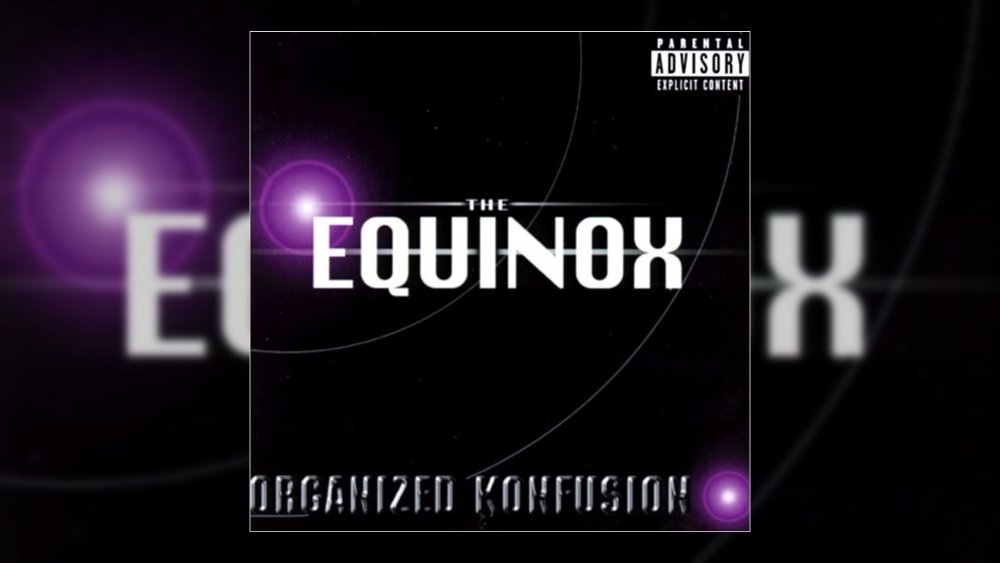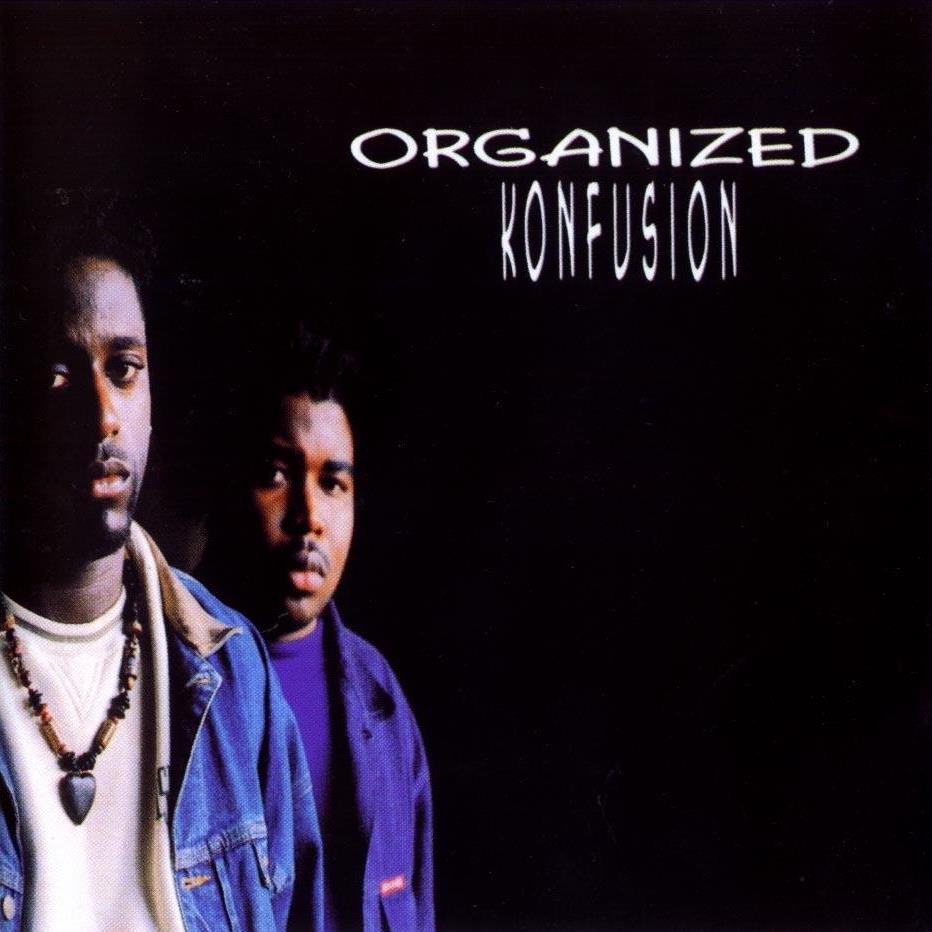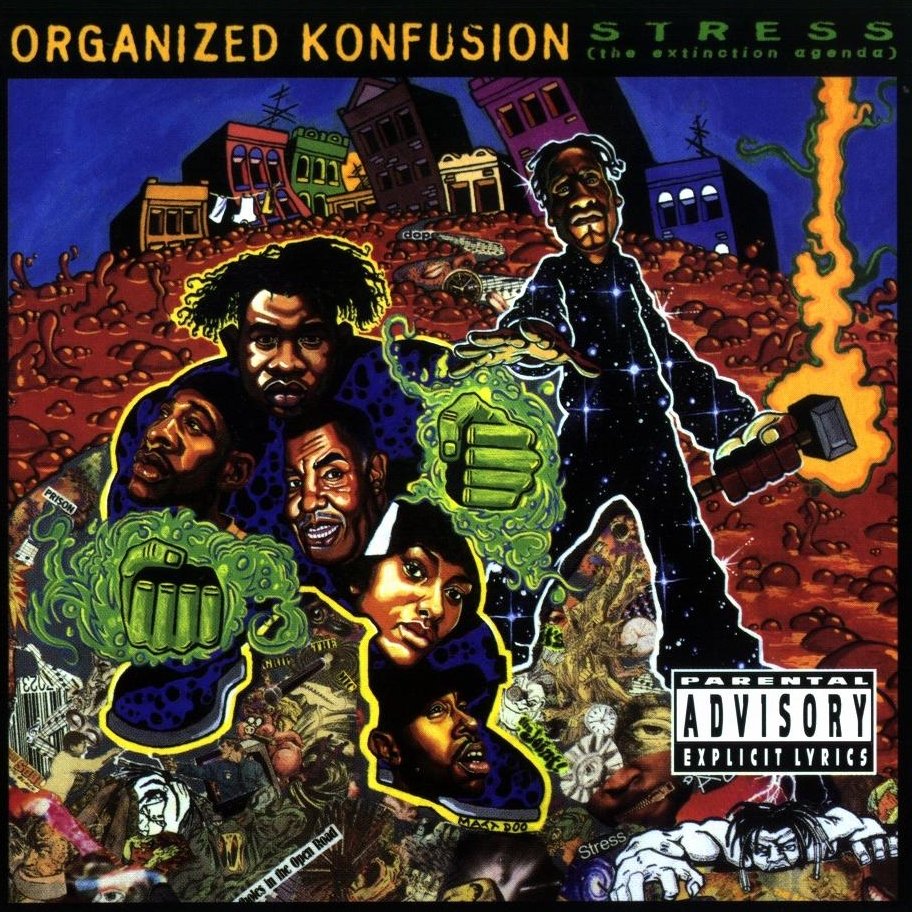Happy 25th Anniversary to Organized Konfusion’s third & final studio albumThe Equinox, originally released September 23, 1997.
In September of 1997, I was fifteen years old, beginning my 10th grade year at Edmondson-Westside High School in Baltimore, Maryland. At the top of my list of priorities was cracking the code to being a cool kid in my school and around my neighborhood. In most categories, I wasn’t doing too badly; my t-shirts coordinated with my assortment of Timberland boots, and I was virtually unbeatable in PlayStation’s Tekken 3 and NFL Game Day ’98. What I couldn’t figure, however, was why what I thought to be the best hip-hop music remained exclusive to me and just a small group of my closest friends.
As the school year began, it felt like I was the only one who returned with O.C.’s Jewelz and Diamond D’s Hatred, Passions and Infidelity as essentials in my Jansport backpack. Less than a month into my sophomore year, it seemed as if I was the only one racing out to cop Organized Konfusion’s third installment The Equinox.
Early into the track list it appears that the underground rap veterans were also wondering why their complex style was evading the masses. On the Diamond D assisted “Questions,” the South Jamaica, Queens duo rocked back and forth with a conversational chorus, which seemed to contemplate the possibilities of such a cultural conundrum. Inquiring “Yo, I got a question - in hip-hop, who they followin’? / The niggas with skills or them niggas who be hollerin’? / Them niggas that be hollerin is substitute, modelin’ / Niggas with skills always and forever keeps a followin’ / Swallowin’ pride / Never, we be imperialistic / Who rips shit, without being materialistic?”
Giving some food for thought, “Questions” for the most part landed as a well delivered sermon to a preacher’s small but nonetheless devoted congregation. Regardless of who was listening, behind “9x Out of 10,” “Questions” helped set the pace for the third installment in the discography of one of hip-hop’s most lyrically imaginative tag-teams.
Since debuting in 1991, Organized Konfusion earned critical acclaim and industry respect, using ingenuity to mark their distinction. Self-producing their entire eponymous debut, the album packed as much funk as an EPMD or Marley Marl orchestrated affair, heavily sampling ‘70s soul acts like the Skull Snaps, The JB’s, and Kool & the Gang.
Listen to the Album:
Dispelling the musical unicorn of a sophomore jinx, Organized perfected their craft in 1994 with the release of Stress: The Extinction Agenda. Teaming with D.I.T.C.’s Buckwild for one of his early signs of beat-making brilliance, the group scored their most commercially successful single with “Stress” which was accompanied by an equally dope Large Professor remix. Competing with “Stress” for the hallmark of the LP, “Stray Bullets” solidified the group’s signature brand of conceptual lyricism, and garnered enough attention to stamp not only the group but Pharoahe Monch in particular as a force to be respected if not feared in the rap game. Overlooked within its industry buzz was the home team production of “Stray Bullets,” which was as clever and skillful in its extractions of Donald Byrd’s “Wind Parade" as The Beatminerz with Black Moon’s “Buck ‘Em Down.”
Relinquishing a good deal of the production duties into the capable hands of D.I.T.C. members Diamond D, Showbiz, and Buckwild, along with Def Squad affiliate Rockwilder and others, Organized focused more on the lyrical side of their songcraft, allowing their imaginations the full range of creating an entire LP around a central concept.
The narration of tales from the underworld falls short of competing with an Elmore Leonard novel, and narrowly holds the concept together. But even with the uneventful storytelling outside of the bars, Prince Poetry and Pharoahe Monch still fall into rhythm like Marvel Comics’ Power Man and Iron Fist through most of the album, giving a valiant stand off against the Jigginess and Big Willie-isms of the time.
“My strategies be tragedy to MCs, who receive certificates from rap academies / I'm terrific with wordplay, specific with verbs / say we step it up, to the next level,” Pharoahe kicked off the battle rap themed “Soundman”, before tagging in his rhyme partner Po, who added, “I eat MCs of all kinds / spit out the rhyme, regurgitate their mind state / cause I don't eat swine / set it straight, online / internet programmed to climb.”
The group’s back-and-forth exchange picked up exactly where it left off almost three years earlier, but it was now crushing with more melodic beats. With songs like “Soundman,” the two wordsmiths exchanged bars, dazzling audiences with Pharoahe’s polysyllabic word patterns that were either complemented by Prince Po’s or contrasted with his groovier flow that rode beats with perfect timing.
Even with their respective styles nearly perfected, the two professional emcees consistently made it clear that bars were the priority. On “Somehow, Someway,” Po boasts “Intelligent words, is colors inside of this rap vision / liquidized for precision which cleanses 'em like baptism / I bless souls through the worlds’ second religion / from the left with angles to enlarge the prism.” Monch then follows up with his war declaration against limited emcees, rhyming “Pharoahe, eager to see feeble intermediate MCs / immediately, deleted repeatedly / y'all know the unprecedented / without herb every single word'll be verbally demented, presented / so that when it disintegrates, no sentiments / I’m imminent standin' alone and get your tenement.”
Enjoying this article? Click/tap on the album covers to explore more about Organized Konfusion:
The heart of the LP takes place on the metaphoric battlefield of the duo’s proxy war against their perceived culture vultures, with ”Confrontations,” one of the more epic showdowns, produced by Showbiz. The Bronx, NY native who came to fame in 1992 with his partner A.G. slows his normal pace, with a base heavy chord that serves as the backdrop of the group’s detailing of a bar room brawl.
Unlike other LPs of the underground subgenre, The Equinox wasn’t a complete sausage party, the two spit kickers actually take a few breaks from the hard knocks to entertain the ladies as well. The versatile Buckwild provides an upbeat neck-snapper for Po and Monch on “Shugah Shorty,” which demonstrates that even the most devout back-packer wasn’t above some shameless cat-calling while walking down Jamaica Ave, in Queens, NY. A rare appearance by another Def Squad affiliate, Hurricane G., on the track adds some spice to the otherwise grim LP full of hardened battle raps.
Collaborating for their second song on the album, Buckwild again blesses the duo for the album’s most introspective moment with “Invetro.” Building on their brand of being super skilled lyricists, the two give voice to preborn babies on opposite sides of the thought spectrum. Monch delivers first with “I'd rather not be born / than to be scorned in this world of hate / where life escape me and stick with me like thorn / wild like child porn-ography / the autobi of the unborn” and closes with Prince Po’s “I'd rather be born, shine as the true and livin' / spawned to live this gift, to the fullest shit is on / still rethinkin' my position until I'm gone / mission is to elevate minds / glisten, destined forever, weather the storm.”
With other noteworthy songs like “Hate,” delivered from the perspective of white supremacists, and the appropriately titled ode to arithmetic “Numbers,” The Equinox reinforces that the pairing of Prince Po and Pharoahe Monch provided them with an unfair advantage across the hip-hop landscape. The two lyrical demigods simply seemed to effortlessly surface unscathed from every emcee battle.
What confounded me in my teens, namely how the rest of the world was slow to catch on to the brilliance of Monch and Po, I now find solace in as I enjoy my thirties. Appreciation of the two super emcees, who became my rap heroes, was reserved for super fans, who understood that exceptional lyricism, beat-making, and songwriting are the true virtues of the culture. Looking back, I think I was a pretty cool kid for recognizing this type of talent at only fifteen years of age.
LISTEN:
Editor's note: this anniversary tribute was originally published in 2017 and has since been edited for accuracy and timeliness.



